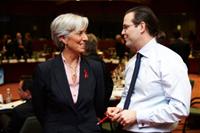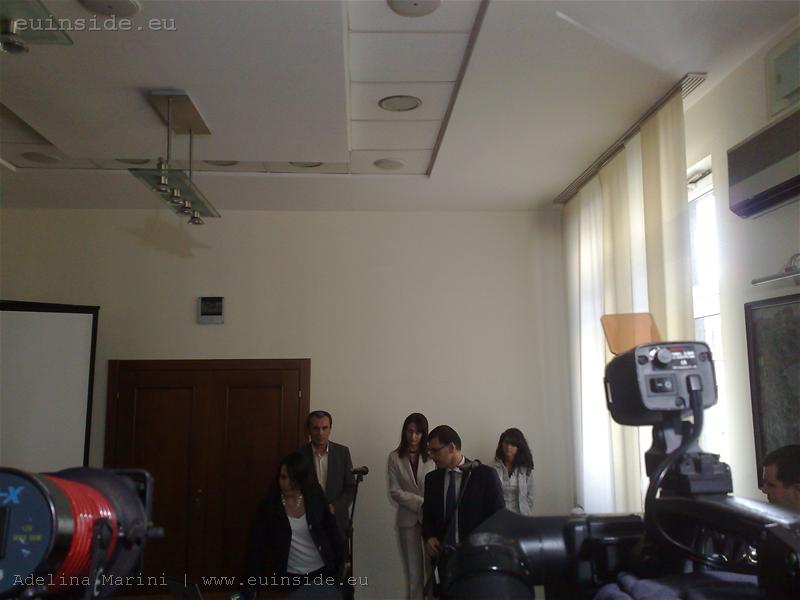ECOFIN finally agreed on micro supervision
Adelina Marini, December 3, 2009
 The Council of EU finance ministers (ECOFIN) succeeded in agreeing on financial supervision in the EU. So far, it there was an agreement on the system of macro supervision, because there were a lot of differences regarding control on micro level. The Council agreed on draft regulations for the establishment of a European Banking Authority, a European Insurance and Occupational Pensions Authority and a European Securities and Markets Authority.
The Council of EU finance ministers (ECOFIN) succeeded in agreeing on financial supervision in the EU. So far, it there was an agreement on the system of macro supervision, because there were a lot of differences regarding control on micro level. The Council agreed on draft regulations for the establishment of a European Banking Authority, a European Insurance and Occupational Pensions Authority and a European Securities and Markets Authority.
In October ECOFIN agreed on a general approach aimed at establishing a European Systemic Risk Board to monitor potential threats to the stability of the financial system on a macro level. The draft regulations are part of a package of proposals to reform the EU framework for the supervision of banking, insurance and securities markets in the wake of the global financial crisis.However, to enter into force, the regulations need to be approved by the European Parliament after negotiations procedure, which has already started.
What will the new three authorities deal with? The three European supervisory authorities will be responsible for ensuring that a single set of harmonised rules and consistent supervisory practices
are applied by national supervisors. Beside this, they will oversee the implementation of a common supervisory culture and will collect micro-prudential information. A basic focus of the authorities will be using full supervisory powers at European level with regard to credit rating agencies. And last but not least, the authorities will try to ensure a coordinated response in crisis situations.
It is expected the new system for European supervision to come into force in 2010 after it is approved by the EP. The three new authorities will be based in Paris, London and Frankfurt. As the Financial Times commented, this is a significant step towards more centralized, pan-European oversight of the securities, banking and insurance markets. That is why there were significant disputes at the Council. The main fears came from Britain which wanted to keep the freedom and independence of the London City.
However, the new authorities will not be able to take decisions that impinge on national budgets, or so-called fiscal sovereignty. The loss of fiscal sovereignty was among the greatest fears of other member states who have well developed financial markets like the Netherlands and Luxembourg.
The attempts to tighten financial regulation within the EU have started a little after the bankruptcy of Lehman Brothers in the US in the autumn of 2008. Initially, after the first severe wave of the financial crisis, followed by an economic crisis, most developed countries agreed for a serious tightening of financial supervision and on large companies. This was even agreed on a G20 level. But later, under the pressure of different financial lobbies and interests, the plans for serious steps towards tight regulations, weakened.
Among the staunchest supporters for more control is France. The wish of the French president Nicolas Sarkozy for more transparency of the financial markets and therefore for more supervision, led to the election of Michel Barnier for the new European Commissioner for the internal market and services, a choice met critically in London. He will be the person to be responsible for the implementation of the new regulations once they are approved by Parliament.
The Alliance of Liberals and Democrats in the European Parliament criticised the results from the ECOFIN, defining them as "difficult to understand". The chairman of the group Guy Verhofstadt said that EU member states were repeatedly saying they wanted a single market for financial services, "but now that the time has come to agree on the basic principle of creating supra-national supervisory authorities, some of them appear totally reluctant".
ALDE also disagrees with the separation of micro-prudential supervision from the macro-prudential one, because thus the Council tries to impose its own views and its own agenda. Mr. Verhofstadt threatened that the European Parliament as co-legislator will play its full role. "It has already decided to consider the proposals on micro and macro prudential supervision as a whole because this is not just a question of competing institutions. European citizens are awaiting efficient measures to prevent new economic and financial crises. European businesses need access to credit", the former Belgian prime minister Guy Verhofstadt added.
 | © euinside
| © euinside